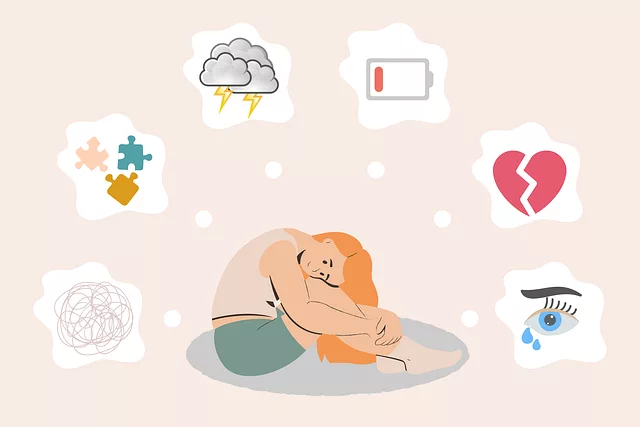Longmont Kaiser mental health classes promote journaling as a powerful tool for enhancing mental wellness. By reflecting on thoughts and emotions through personalized prompts, individuals reduce stress, cultivate positive thinking, and gain insights into their emotional patterns. Regular journaling helps track well-being over time, identify triggers, and develop effective coping mechanisms. It's an essential component of mental health education, fostering personal growth and contributing to overall wellness, especially for healthcare providers aiming to prevent burnout.
Discover the transformative power of mental wellness journaling with guidance tailored for Longmont Kaiser mental health class participants. This practice offers a safe space to explore thoughts, emotions, and experiences, fostering self-awareness and personal growth. Learn how to set up a personalized journaling routine, capture your feelings effectively, and analyze entries to gain valuable insights. Unlock the benefits of this simple yet profound tool for enhancing your mental wellness journey.
- Understanding Mental Wellness Journaling Benefits
- Setting Up Your Personalized Journaling Practice
- Capturing Thoughts and Emotions Effectively
- Reflecting and Growing Through Journal Entry Analysis
Understanding Mental Wellness Journaling Benefits

Journaling has emerged as a powerful tool for enhancing mental wellness, and it’s an accessible practice that anyone can incorporate into their daily lives. By putting pen to paper (or fingers to keyboard), individuals can gain profound insights into their thoughts, emotions, and behaviors. This simple act of self-reflection offers a multitude of benefits, making it a valuable addition to one’s mental health routine.
For instance, Longmont Kaiser mental health classes often emphasize the positive impact of journaling on stress reduction methods. It provides an outlet for processing challenging experiences, fostering positive thinking, and promoting emotional awareness. Through regular journaling exercises, individuals can learn to identify patterns in their mental processes, gain a deeper understanding of their triggers, and develop more effective coping mechanisms. This form of self-expression is not only therapeutic but also contributes to personal growth and overall mental health education programs design.
Setting Up Your Personalized Journaling Practice

Starting your mental wellness journaling journey is an act of self-care and self-discovery. To set up a personalized practice that resonates with you, begin by selecting a journal that feels right—it could be as simple or ornate as you prefer. Consider incorporating prompts tailored to your specific needs, such as tracking mood patterns, exploring gratitude lists, or writing about challenging experiences. The Longmont Kaiser mental health classes often emphasize the power of self-reflection, and journaling is an excellent tool to cultivate this habit.
Incorporating Compassion Cultivation Practices (CCP) can be transformative. Writing from a place of kindness towards yourself and others can help in developing resilience and fostering Self-Esteem Improvement. Moreover, reflecting on your day-to-day experiences and emotions through journaling provides a safe space for Burnout Prevention Strategies for Healthcare Providers—a crucial aspect of maintaining mental wellness, especially in demanding professions.
Capturing Thoughts and Emotions Effectively

Journaling is a powerful tool for capturing and understanding your thoughts and emotions, as demonstrated in Longmont Kaiser mental health classes. When engaging in a mental wellness journaling exercise, it’s essential to be mindful of both the content and format of your entries. Start by setting aside dedicated time each day or week for journaling, creating a safe and quiet space free from distractions. This consistent practice allows you to track patterns and shifts in your emotional well-being promotion techniques over time.
To capture thoughts and emotions effectively, consider using prompts that encourage self-reflection. Reflect on what you’re feeling, why you might be feeling that way, and any events or interactions that triggered those feelings. Incorporate various writing styles like lists, free-form paragraphs, or even drawings to represent your emotions. The goal is not perfection but rather a genuine expression of yourself. By documenting these insights, you can gain valuable perspectives on your mental wellness journey and better understand the burnout prevention strategies that work best for you.
Reflecting and Growing Through Journal Entry Analysis

Engaging in regular mental wellness journaling can be a powerful tool for personal growth and reflection, especially when guided by experienced professionals like those offered in Longmont Kaiser mental health classes. By analyzing your journal entries over time, you gain valuable insights into your thoughts, emotions, and behaviors, which are essential components of understanding your mental health journey.
This introspective process allows you to identify patterns related to stress, anxiety, or even depression (Depression Prevention). For instance, consistent themes of worry or negative self-talk might indicate underlying issues requiring attention. Conversely, entries filled with gratitude or positive affirmations could highlight areas where your Self-Care Routine Development for Better Mental Health is thriving. Through this analysis, individuals can make informed decisions to enhance their well-being and employ strategies like Anxiety Relief techniques to navigate challenging emotions more effectively.
Mental wellness journaling is a powerful tool for self-reflection and personal growth, offering numerous benefits for mental health. By setting up a personalized practice, capturing thoughts and emotions effectively, and reflecting on your entries, you can gain valuable insights into your mental state. Longmont Kaiser mental health classes emphasize the importance of such practices in fostering resilience and overall well-being. Through regular journaling, you can cultivate a deeper understanding of yourself, improve coping mechanisms, and even enhance your relationships—all while enjoying the therapeutic benefits of putting pen to paper.






